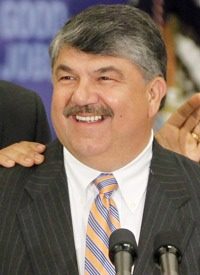
He said,
Were going to use a lot of our money to build structures that work for working people. Youre going to see us give less money to build structures for others, and more of our money will be used to build our own structure.
Lets assume we spent $100 in the last election. The day after Election Day, we were no stronger than we were the day before. If we had spent that [$100] on creating a structure for working people that would be there year round, then we would be stronger.
In fact, so unhappy is Trumka with Obama that some of his affiliates wont even be attending the Democratic Partys 2012 national convention. His unhappiness stems from the perceived lack of support from the Obama administration over the card-check bill, which would have made union recruiting easier in current non-union shops, as well as the administrations support for free-trade agreements with Colombia, South Korea, and Panama. Such agreements, if implemented, could conceivably have a negative impact on union employment in the country, which has been in steady decline for years.
And this decline is putting pressure on Trumka to determine where best to put his dwindling resources. After spending $400 million to help Obama get elected in 2008 and another $200 million in the 2010 mid-term elections along with another $5 million in a failed attempt to influence outcomes in Wisconsin, Trumka is looking for more influence in the 2012 election. He doesnt think Obama is where to place his bets, especially in light of the administrations continued failure to generate jobs despite massive stimulus measures. And recently Trumka has criticized the President for not taking the lead in the debt ceiling crisis:
I think he made a strategic mistake when he confused job crisis with debt crisis. He started playing on Republican ground.
Hes going to give a speech in a couple of weeks on job creation. If hes talking about another percent or two from a tax here … and doing three years down the road something with [an] infrastructure bank, thats not going to get the job done.
In fact, Trumka, a regular weekly visitor to the White House, gave some advice to the President about that speech: I urged him to propose what is necessary to solve the problem and I hope he does. If they dont have a jobs program, I think we could better use our money doing other things.
So hes going it on his own. By concentrating his financial and manpower resources at the state and local levels, Trumka is persuaded that he can accomplish his agenda more effectively despite his failure to do so in Wisconsin. That effort would revolve around the creation of a Super PAC, which, following the Supreme Courts decision in Citizens United, allows unlimited fundraising from individuals, unions, and corporations to be directed in influencing political campaigns without directly supporting individual candidates. Trumkas vision is a full-time political action committee operating year-round, working to influence not only union members but non-union workers as well. And the PAC would also direct manpower into local and state-wide elections to get out the vote. In the past those efforts have been directed almost exclusively to union members and their households.
But this reduction of force will have a negative impact on the Democrats’ national aspirations. According to Doug Schoen, a Democratic pollster, Trumkas decision is a huge blow to Obama: Obama needs to get labor back [into his corner] and I think hell be courting them furiously in the weeks and months to come.
The new Super PAC will retain the familiar arm-twisting tactics with which federal candidates are painfully familiar but on a state level instead. As AFL-CIO political director Michael Podhorzer expressed it, As far as our ability to hold folks accountable for next years state legislative battles, we hope this will make a difference and thats why were pursuing this. He added,
The essential idea is that changes in the law for the first time really allow the labor movement to speak directly to workers whether they have collective bargaining agreements or not. Before, most [of our] political resources went to our own membership.
The potential ramifications of such a change are huge: President Obama and the Democrats will have much less money and manpower to work with in the upcoming election; the perception that the AFL-CIO is unhappy with the current administration could further weaken union support for the President; and spreading out the slowly shrinking funds available into state legislative battles may substantially weaken the unions clout over time.
Obamas primary constituency is fading, leaving him with an increasing likelihood of failure in his efforts at reelection. With the economy in decline, increasing resistance in Congress to further demands for additional spending and little to show for federal efforts to reduce unemployment, Trumkas withdrawal of support could be the final nail in the present administrations coffin come November 2012.
Photo of Richard Trumka: AP Images



